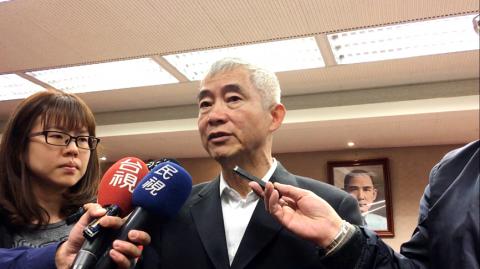Uber would not be welcomed back to Taiwan if it refuses to pay penalties owed to the government, Minister of Transportation and Communications Hochen Tan (賀陳旦) said yesterday.
Hochen made the remark during a meeting of the Legislative Yuan’s Transportation Committee, whose members were scheduled to unfreeze the budgets of some agencies under the Ministry of Transportation and Communications.
Lawmakers focused questioning on how the ministry would react to the ride-sharing service provider’s return to the nation.

Photo: Hsiao Yu-hsin, Taipei Times
Democratic Progressive Party Legislator Cheng Pao-ching (鄭寶清) said the ministry’s relationship with Uber was like that of a man with an ex-girlfriend who broke up with him.
The ministry and Uber “broke up” because the ministry did not agree with the firm’s hiring of unlicensed vehicles and drivers to offer a taxi service, as well as its failure to pay taxes on revenue earned in the nation, he said.
Uber’s failure to purchase insurance required to operate a taxi service and its fickleness in operational strategies led to the two parting ways, he added.
Pressed by Cheng, Hochen said that Uber must pay the penalties it owes the government, otherwise the ministry would not welcome its return.
The firm partnering with car rental operators would fulfill legal requirements as long as Uber only serves as a platform to match requests from users with legal service providers, which would differ from the model it previously employed, in which it recruited drivers without taxi licenses to provide transportation services, he said.
Apart from the NT$830 million (US$27.4 million) in penalties it owes the ministry, Uber has also failed to pay the Ministry of Finance NT$135 million in revenue tax, Hochen said, adding that the government would not forgive such debts.
The transportation ministry cannot prevent Uber from working with legal car rental firms, Hochen said, but added that such providers should consider all possible scenarios, including what they would do if Uber leaves Taiwan because of the penalties.
Prior to announcing its return yesterday, Uber had asked its former drivers in the nation to provide a commercial vehicle driver’s license and other documents, saying that it would match them with affiliated car rental companies.
Hochen said that Uber executing such plans would be illegal, because car rental companies are required to have their own fleet of vehicles and hire their own drivers, adding that they cannot hire outside drivers and ask them to use their cars to offer services.
Taiwan Uber Drivers Alliance representative Adam Shen (沈柏耀) said that there are about 10,000 former Uber drivers in the nation, of whom about 20 to 30 percent are licensed to drive rental cars, adding that Uber’s decision to partner with car rental firms would not benefit the majority of its former drivers, as most would be unable to continue working with the firm.
Drivers would need to “obtain a commercial vehicle driver’s license and be hired by a car rental operator, which would charge drivers NT$1,000 to NT$2,000 per month to be listed on its payroll,” Shen said. “Drivers would also have to start paying vehicle registration and fuel taxes based on rates for commercial vehicles.”
“It would not be worth it for those who only drive part-time for 10 hours per week, as the overhead would increase,” he added.

An essay competition jointly organized by a local writing society and a publisher affiliated with the Chinese Communist Party (CCP) might have contravened the Act Governing Relations Between the People of the Taiwan Area and the Mainland Area (臺灣地區與大陸地區人民關係條例), the Mainland Affairs Council (MAC) said on Thursday. “In this case, the partner organization is clearly an agency under the CCP’s Fujian Provincial Committee,” MAC Deputy Minister and spokesperson Liang Wen-chieh (梁文傑) said at a news briefing in Taipei. “It also involves bringing Taiwanese students to China with all-expenses-paid arrangements to attend award ceremonies and camps,” Liang said. Those two “characteristics” are typically sufficient

A magnitude 5.9 earthquake that struck about 33km off the coast of Hualien City was the "main shock" in a series of quakes in the area, with aftershocks expected over the next three days, the Central Weather Administration (CWA) said yesterday. Prior to the magnitude 5.9 quake shaking most of Taiwan at 6:53pm yesterday, six other earthquakes stronger than a magnitude of 4, starting with a magnitude 5.5 quake at 6:09pm, occurred in the area. CWA Seismological Center Director Wu Chien-fu (吳健富) confirmed that the quakes were all part of the same series and that the magnitude 5.5 temblor was

The brilliant blue waters, thick foliage and bucolic atmosphere on this seemingly idyllic archipelago deep in the Pacific Ocean belie the key role it now plays in a titanic geopolitical struggle. Palau is again on the front line as China, and the US and its allies prepare their forces in an intensifying contest for control over the Asia-Pacific region. The democratic nation of just 17,000 people hosts US-controlled airstrips and soon-to-be-completed radar installations that the US military describes as “critical” to monitoring vast swathes of water and airspace. It is also a key piece of the second island chain, a string of

The Central Weather Administration has issued a heat alert for southeastern Taiwan, warning of temperatures as high as 36°C today, while alerting some coastal areas of strong winds later in the day. Kaohsiung’s Neimen District (內門) and Pingtung County’s Neipu Township (內埔) are under an orange heat alert, which warns of temperatures as high as 36°C for three consecutive days, the CWA said, citing southwest winds. The heat would also extend to Tainan’s Nansi (楠西) and Yujing (玉井) districts, as well as Pingtung’s Gaoshu (高樹), Yanpu (鹽埔) and Majia (瑪家) townships, it said, forecasting highs of up to 36°C in those areas